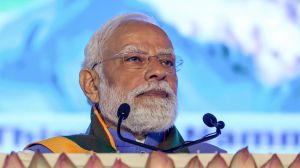A secular Bangladesh: Countrys top court lifts 4-year stay on order banning religion in politics
The Supreme Court of Bangladesh has lifted a four-year stay on a ban on the abuse of religion for political purposes to start a slow walk back...
The Supreme Court of Bangladesh has lifted a four-year stay on a ban on the abuse of religion for political purposes to start a slow walk back to the originally envisaged secular Bangladesh.
The January 3,2010 order came a week before Bangladesh Prime Minister Sheikh Hasinas official visit to India starting January 11.
The order marks Bangladeshs return to its original Constitutional character,shedding its forced identity as a Muslim country,which endeavour(s) to foster further relations amongst only Muslim countries based on Islamic solidarity.
With its decision to lift the stay,the apex court of Bangladesh has endorsed the August 29,2005 judgment of a three-judge Bench led by Justice ABM Khairul Haque which declared the Fifth Amendment to the countrys Constitution as void ab initio and illegal.
The Fifth Amendment had legitimised all governments that had been in power following the coup of August 15,1975,until April 9,1979,including the late President Zia-ur-Rehmans ascension to the presidency. The Amendment legitimised Bismillah-ar-Rahman-ar-Rahim in the preamble of the countrys Constitution,and ratified over a hundred military proclamations and orders.
The Bench headed by Justice Haque observed that the damage done by the junta starts with its Proclamation Order of 1977 which omitted Article 12 (secularism and freedom of religion),the unique basic feature of the Constitution.
Secularism means both religious tolerance as well as religious freedom. The State must not seen to be favouring any particular religion,rather,ensure protection to the followers of all faiths without any discrimination including even to an atheist, the Bench observed four years ago.
The Bench condemned the juntas efforts to change the Constitution in a bid to transform the secular Bangladesh into a Muslim country.
The original Constitution of Bangladesh had called for the State to base its international relations on national sovereignty and equality. Changes introduced by the military rulers said that the state shall endeavour to consolidate,preserve and strengthen fraternal relations among Muslim countries based on Islamic solidarity.
The Supreme Courts lifting of the stay on the ban on Sunday brings back into effect Article 38,which bans the use of religion or the pursuit of activities communal in nature. The Article was set aside by the military rulers in 1976,making constitutional room for the entry of religion and communalism into national politics.
The 2005 Bench had said,Our liberation war was fought on these high ideals of nationalism,socialism,democracy and secularism. These high ideals inspired our heroic people to dedicate themselves and our brave martyrs to sacrifice their lives in the national liberation struggle.
Following the revival of the 2005 judgment,Bangladesh Law Minister Ahmad Shafique told reporters,We want to reinstate the original Constitution. Secularism was a pillar of the 1972 Constitution.
However,the main opposition party,Bangladesh Nationalist Party (BNP),which is allied with two other Islamic parties,has reportedly said it will appeal the 2005 verdict.
Commending the Bangladesh Supreme Court for the order,senior advocate and leading jurist Harish Salve told The Indian Express that it was relatively simple for India to follow in its neighbours footsteps.
I compliment the Bangladesh Supreme Court. When religious fundamentalism is brewing,it is commendable for a countrys Supreme Court to uphold secularism. This is fantastic, Salve said.
It is relatively simple for a robust democracy like ours to do it (ban religion symbolism from politics). The country has always listened to its Supreme Court, Salve added.







- 0113 hours ago
- 0222 hours ago
- 0311 hours ago
- 0413 hours ago
- 0522 hours ago
























